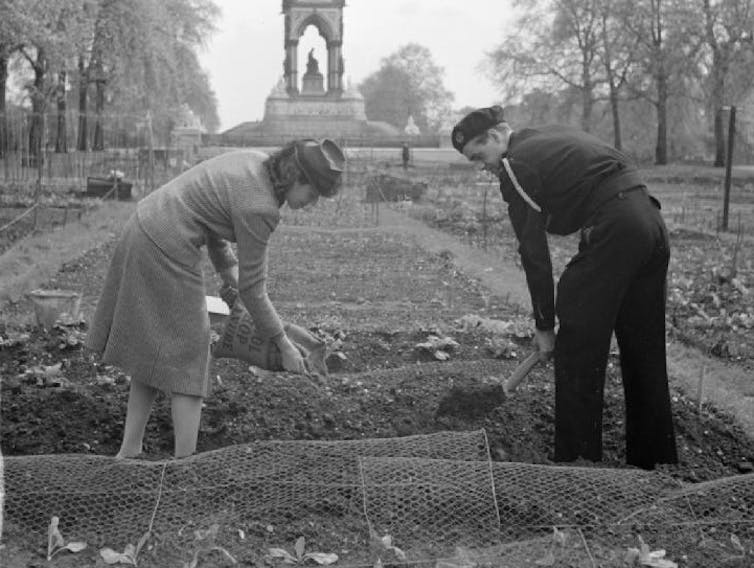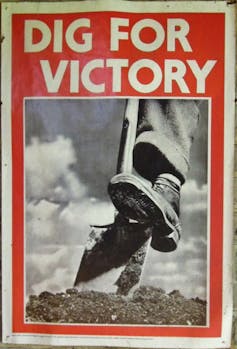'Dig for Brexit' comments reveal the UK government digging a food security hole for itself
Courtesy of David Barling, University of Hertfordshire

‘Dig For Victory’, first time around on an allotment in London’s Kensington Gardens. Imperial War Museum
According to UK transport secretary Chris Grayling, in the event the UK is unable to agree a trade deal with the European Union it can make up for the loss of tariff-free movement of food across the single European market by importing more food from beyond Europe and by British farmers simply “growing more food”. He makes it sound so easy.
More than 40 years of food supply chain integration has left Britain importing almost 60% of its food from the EU, particularly fruit and vegetables. But Europe is also a key market for Britain’s food exports, notably 96% of British beef and lamb, and crops such as wheat and barley. After Brexit, tariffs will significantly increase the cost of these exports. Will UK products be priced out of these markets? Or will the UK government offset the price increase by compensating producers?
Under the terms of World Trade Organisation agreements, the amounts required to compensate farmers for the tariff levels likely to be applied to meat exports could be met under existing WTO rules for agricultural support. But negotiating a trade deal with the EU would be a much better outcome.
Scenarios developed by the Agriculture and Horticulture Development Board, which provides research and development and advice to the farming sector, indicates that only the highest performing 25% of farms will remain profitable. If the government doesn’t step in with similar levels of support offered by the EU’s Common Agricultural Policy, the impact of a no trade deal will drive smaller farmers out of business. Similarly, faced with the loss of the immigrant labour from the continent required to harvest and process produce, the fruit and vegetable sector would be devastated.
The devil is in the (lack) of detail
The current secretary of state for the Department of the Environment, Farming and Rural Affairs, Michael Gove, has made more emollient statements regarding post-Brexit support for British farming, including maintaining incentives for farmers to improve their ecosystems while seeking to maintain high quality produce and improve productivity. However, the lack of detail means that it’s impossible to know the focus and extent of such support to British farmers and producers.
The UK measures its ability to home-grow its food through the food production to supply ratio, a measure of food’s traded value calculated as the farm-gate value of raw food production divided by the value of raw food for human consumption. Defra’s statisticians calculate that this is the closest way to match food production to what consumers actually eat, much of which is manufactured food composed of different raw ingredients combined and sold at a higher price.
By this value-based measure, 61% of the food eaten in the UK in 2015 was produced in the UK, rising to 76% among indigenous foodstuffs. The rest was imported. To increase the amount of UK-produced food to imported food would require government support, not just in compensation to farmers but in terms of a clear and detailed food policy strategy.

British propaganda from World War II. UK Government/andymag, CC BY
Food supply is complex, partly due to much of what we eat being assemblages of different food ingredients sourced from different locations across the world. These might be processed and manufactured foods with numerous ingredients, or mass-produced meats such as chicken and pork that rely on imported feed, and there is no guarantee that these will be easily or cheaply available in the future.
Outside the EU, international market competition from big players such as China will continue to affect the UK’s ability to easily and cheaply acquire other key industrial farming necessities, such as soya-based animal feed, phosphorus fertilisers or plant oils. Privately, large food manufacturers are considering these risks and to what extent they can substitute key ingredients if necessary.
These uncertainties and vulnerabilities point to the desperate need for a clear vision of how to provide food for Britain after Brexit. To what extent should the country be able to feed itself, and how can this be measured?
Using the economic value of food ignores the current problems of calories and nutrients, and the expanding problem of obesity and its costs to society and the health service. The FAO defines “food security” not as just access to sufficient food, but “safe and nutritious food that meets their dietary needs and food preferences for an active and healthy life”.
Using the economic value of food as a basis for measuring food security ignores the fact that we eat calories and nutrients, not economic value. Using a dietary-based approach to measure the UK’s ability to feed itself would provide a far more useful measure of its food security and supply.
![]() A broader vision for a UK food policy is needed that embraces healthy production and consumption, while protecting the natural resources and heritage upon which farming depends. So far it seems the government has little grasp of the important matters on which more detail is needed if the UK’s food supply chains are to feed a nation.
A broader vision for a UK food policy is needed that embraces healthy production and consumption, while protecting the natural resources and heritage upon which farming depends. So far it seems the government has little grasp of the important matters on which more detail is needed if the UK’s food supply chains are to feed a nation.
David Barling, Professor of Food Policy and Security, Director of the Centre for Agriculture, Food and Environmental Management, University of Hertfordshire
This article was originally published on The Conversation. Read the original article.



